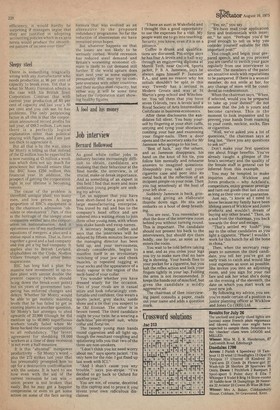Sleepy steel
There is something tragically wrong with any manufacturer who needs production at 96 per cent of capacity to break even. Yet that is what Sir Monty Finniston admits is the case with his British Steel Corporation. Contrast that with current year production of 65 per cent of capacity and last year's 80 per cent and you can see he has 'problems. The only perplexing factor in all this is that the corpor ation announced record profits for last year, of £89.3 million. I am sure there is a perfectly logical sexplanation other than political playing with figures, and I am just too thick to appreciate it.
But all that is by the way, since SieMonty is telling us that instead of the £2 million loss he expected he is now running at £5 million a week loss which does not say much for prescience but should ensure that the BSC loses £250 million this financial year. In addition, the prospect of getting the corporation right in our lifetime is becoming, remote.
The cause of the problem is threefold: antique plant, too many men, and low prices. A large proportion of BSC's equipment is • by the chairman's admission "ob solete or obsolescent". Part of this is the heritage of the sleepy steel companies welded into the corpor ation on nationalisation. And it epitomises one of my mathematical equations of mergers: a plus and a minus equal a minus. That is, force together a good and a bad company and yon get a big bad company. It applies also to British Leyland, shipbuilders on the Clyde, Norton Villiers Triumph, and other Benn inspirations.
BSC has long had a plan for massive new investment in up-todate plant with almost double the present capacity (which should ,bi ing down the break-even point) but six years of government tampering has enforced changes and delays. Whether Sir Monty , would be able to get realistic manning levels that he has failed to get in existing plants is another question. Sir Monty's last attempts to shed upwards of 22,000 (though he did mention up to 40,000) superfluous workers totally failed when Mr Benn backed the unions' opposition, to all redundancy. The latest agreement for shedding 10,000
workers at a time of deep recession is not even a half-measure.
It is this "abysmal" manpower productivity — Sir Monty'S word 7 plus the 272 strikes last year that
has presumably prompted .him to opt for a destructive confrontation with the unions. It is hard to see how even with the aid of the current recession he can win — union power is not broken that easily. But he may get a happier compromise or even to get some action on some of the face saving
formula that was evolved as analternative to the proposed redundancy programme. So far the reduction of absenteeism etc have remained pious hopes.
But whatever happens on that the losses are not likely to be seriously curbed. World recession has reduced steel demand and Britain's worsening economic climate is likely to cut demand still further. If the world upturn does start next year as some suppose, presumably BSC may try to compete overseas with other countries and their surplus steel capacity, but either way it will be some time before the corporation start showing healthy figures.


































 Previous page
Previous page